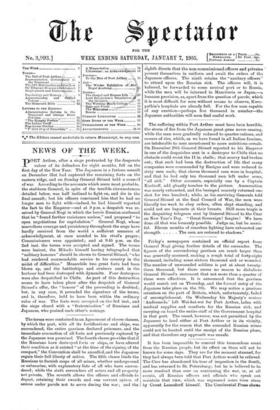The terms were contained in an Agreement of eleven clauses,
by which the port, with all its fortifications and ships, was surrendered, the entire garrison declared prisoners, and the immediate evacuation of all forts not previously captured by the Japanese was promised. The fourth clause provides that if the Russians have destroyed forts or ships, or have altered their condition as it existed "at the time of the signing of the compact," the Convention shall be annulled, and the Japanese regain their full liberty of action. The fifth clause binds the Russians to furnish maps of all mines, whether underground or submarine, with explanatory lists of all who have surren- dered; while the sixth surrenders all mines and all property not private. The seventh allows the officers and officials to depart, retaining their swords and one servant apiece, of course under parole not to serve during the war; and the I
22
eighth directs that the non-commissioned officers and privates' present themselves in uniform and await the orders of the Japanese officers. The ninth retains the "sanitary officers" to attend upon the Russian sick. The officers will, it is believed, be forwarded to some neutral port or to Russia, while the men will be interned in Manchuria or Japan,—a humane provision, as, apart from the question of parole, which it is most difficult for men without means to observe, Kuro- patkin's hospitals are already full. For the few men capable of any exertion—perhaps five thousand in number—the Japanese authorities will soon find useful work.














































 Previous page
Previous page